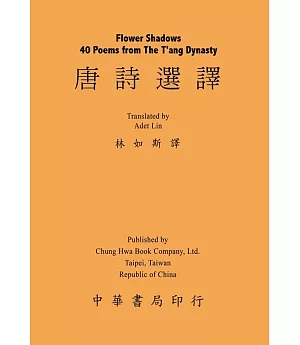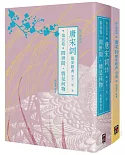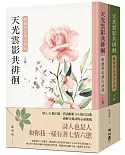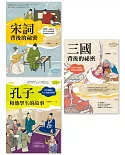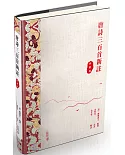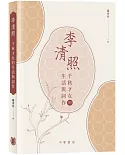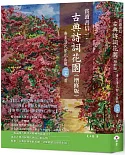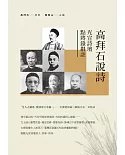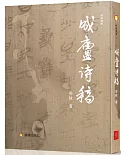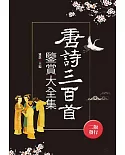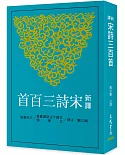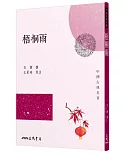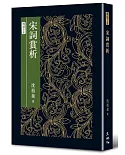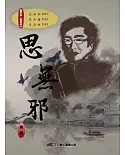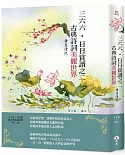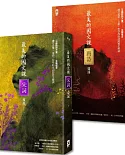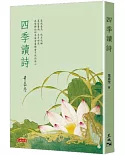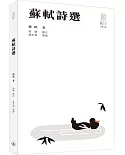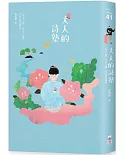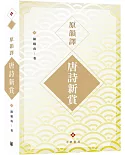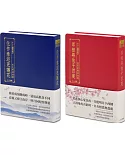本書為作者擔任故宮出版品主編期間的著作。古詩的翻譯工作實不容易,作者兼具深厚的文學根柢與英文能力,將唐詩譯得精準且動人。林語堂在本書序文中說到:「首先,要對詩的本原有所認識。其次。要在英譯的過程中不丟失詩之精髓。以上兩者實則合二為一,即要把真正的詩同詞語的一般性組合加以區別。我欣喜地看到。本書的譯者在此方面做得非常出色。」中國學者沙楓在《中國文學英譯絮談》中盛讚林如斯所譯劉禹錫〈宮詞〉比兩位外國學者更準確、優美。
本書特色
1.本書為唐詩最優美的翻譯著作,此為作者擔任故宮出版品主編期間的作品。
2.文學大師林語堂及中國學者沙楓均盛讚此唐詩譯作精準且動人。
作者介紹
作者簡介
林如斯(1923-1971年)
民初文學大師林語堂長女。自小即嶄露文學天賦,從七歲起,便開始有文章在雜誌發表,以其為父親大作《京華煙雲》寫書評驚豔文壇。愛國心強烈,曾投筆從戎,於對日抗戰勝利後退伍。畢業於美國哥倫比亞大學,著有《唐詩選譯》(中英文對照)、The Milky Way: And Other Chinese Folk Tales、Dawn over Chungking二書。
林如斯(1923-1971年)
民初文學大師林語堂長女。自小即嶄露文學天賦,從七歲起,便開始有文章在雜誌發表,以其為父親大作《京華煙雲》寫書評驚豔文壇。愛國心強烈,曾投筆從戎,於對日抗戰勝利後退伍。畢業於美國哥倫比亞大學,著有《唐詩選譯》(中英文對照)、The Milky Way: And Other Chinese Folk Tales、Dawn over Chungking二書。
目錄
1. The Resort Hut of Su
Tsu Yung
2. Spring in the Mountains
Ts’en Ts’an
3. Of Myself
Li Po
4. In Imitation of the style of Ts’ui Kuo Fu-1
Han Wu
5. In Imitation of the Style of Ts’ui Kuo Fu-2
Han Wu
6. In Imitation of the Style of Ts’ui Kuo Fu-3
Han Wu
7. You Have Gone Away Now
Chang Chiu Ling
8. With the Ladies of Pleasure on a Summer Trip-1
Tu Fu
9. With the Ladies of Pleasure on a Summer Trip-2
Tu Fu
10. For Councilor Kao
Kao Tsien
11. A Notation to Spring
Liu Yu Hsi
12. Passing the Wineshop
Wang Chi
13. The Rooms of Zen Behind the Ancient Temple
Tsang Chien
14. For Minister Hsu Looking out on Chung Nan Shan
Wang Wei
15. Farewell
Wang Wei
16, Mountain Birds
Wang Wei
17. Late May
Tsao Pin
18. Waking in Spring
Meng Hao Jan 18
19. Visit to the Hermit
Chia Tao
20. On Chu River
Tu Fu
21. By the Chien-teh River
Meng Hao Jan
22. Casual Pleasure
Tu Fu
23. Dialogue in the Mountains
Li Po
24. Country Fair
Chang Yen
25. Casual Thoughts
Chang Chiu Ling
26. Delayed on the Shu Path
Chang Yueh
27. Autumn Day Ken Wei
28. Composed at Random
Chen Ming Tao
29. On the Soochow Parapet
Li Po
30. By Chin Huai River
Tu Mu
31. Four Lines
Tu Fu
32. On the Prairie
Po Chu I
33. Farewell to a Friend
Li Po
34. Farewell to a Friend Going to Shu
Li Po
35. Farewell at Peony Tower to Hsin Tsien
Wang Tsang Ling
36. Moonlight Night
Li Po
37. Yu Chieh Yuen
Li Po
38. Letters of Autumn-1
Wang Tsang Ling
39. Snow on the River
Liu Chung Yuan
40. For the Hut of Master Yi
Meng Hao Jan
Tsu Yung
2. Spring in the Mountains
Ts’en Ts’an
3. Of Myself
Li Po
4. In Imitation of the style of Ts’ui Kuo Fu-1
Han Wu
5. In Imitation of the Style of Ts’ui Kuo Fu-2
Han Wu
6. In Imitation of the Style of Ts’ui Kuo Fu-3
Han Wu
7. You Have Gone Away Now
Chang Chiu Ling
8. With the Ladies of Pleasure on a Summer Trip-1
Tu Fu
9. With the Ladies of Pleasure on a Summer Trip-2
Tu Fu
10. For Councilor Kao
Kao Tsien
11. A Notation to Spring
Liu Yu Hsi
12. Passing the Wineshop
Wang Chi
13. The Rooms of Zen Behind the Ancient Temple
Tsang Chien
14. For Minister Hsu Looking out on Chung Nan Shan
Wang Wei
15. Farewell
Wang Wei
16, Mountain Birds
Wang Wei
17. Late May
Tsao Pin
18. Waking in Spring
Meng Hao Jan 18
19. Visit to the Hermit
Chia Tao
20. On Chu River
Tu Fu
21. By the Chien-teh River
Meng Hao Jan
22. Casual Pleasure
Tu Fu
23. Dialogue in the Mountains
Li Po
24. Country Fair
Chang Yen
25. Casual Thoughts
Chang Chiu Ling
26. Delayed on the Shu Path
Chang Yueh
27. Autumn Day Ken Wei
28. Composed at Random
Chen Ming Tao
29. On the Soochow Parapet
Li Po
30. By Chin Huai River
Tu Mu
31. Four Lines
Tu Fu
32. On the Prairie
Po Chu I
33. Farewell to a Friend
Li Po
34. Farewell to a Friend Going to Shu
Li Po
35. Farewell at Peony Tower to Hsin Tsien
Wang Tsang Ling
36. Moonlight Night
Li Po
37. Yu Chieh Yuen
Li Po
38. Letters of Autumn-1
Wang Tsang Ling
39. Snow on the River
Liu Chung Yuan
40. For the Hut of Master Yi
Meng Hao Jan
內容連載
FOREWORD
Miss Lin, daughter of Lin Yutang, spent almost 5 years translating these poems while she was also busy occupied with her other works in New York. These are favorite poems of her as well as of many other Chinese. She learned T’ang poetry from her father as a young girl, together with Chinese classics. And though she has spent the major part of her life abroad she vividly remembers the countrysides and the seasons of China from childhood trips and her two years’ stay at Kunming. It is this combination of personal experience plus hard work that has made these translations worthwhile.
Translation is an art, a work of love as well as a necessity for better understanding of Chinese culture. I find these translations refreshing and enduring. They are a good guide to appreciation of the Chinese original. Students and scholars would both find these poems useful. The moods and subtleties of T’ang poems are well conveyed, and the perfection of the original works in Chinse stands out even more illuminatingly through an understanding of both languages.
I am proud to be Miss Lin’s superior at the National Palace Museum, where she has done many translations for the Quarterly, the Newsletter and other publications. I find her a sincere person, and write these few words in appreciation of her talent in rendering these short and famous poems of the T’ang dynasty into English.
Chiang Fu-tsung December 1969
Miss Lin, daughter of Lin Yutang, spent almost 5 years translating these poems while she was also busy occupied with her other works in New York. These are favorite poems of her as well as of many other Chinese. She learned T’ang poetry from her father as a young girl, together with Chinese classics. And though she has spent the major part of her life abroad she vividly remembers the countrysides and the seasons of China from childhood trips and her two years’ stay at Kunming. It is this combination of personal experience plus hard work that has made these translations worthwhile.
Translation is an art, a work of love as well as a necessity for better understanding of Chinese culture. I find these translations refreshing and enduring. They are a good guide to appreciation of the Chinese original. Students and scholars would both find these poems useful. The moods and subtleties of T’ang poems are well conveyed, and the perfection of the original works in Chinse stands out even more illuminatingly through an understanding of both languages.
I am proud to be Miss Lin’s superior at the National Palace Museum, where she has done many translations for the Quarterly, the Newsletter and other publications. I find her a sincere person, and write these few words in appreciation of her talent in rendering these short and famous poems of the T’ang dynasty into English.
Chiang Fu-tsung December 1969

